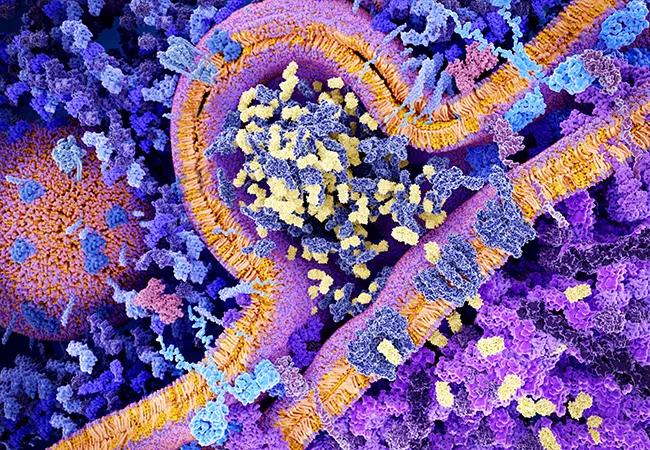Treatment may be a lifesaving option for patients with relapsed or refractory disease

Patients who have diffuse large B-cell lymphoma (DLBCL) with molecular features that predict poor outcomes with traditional first-line chemoimmunotherapy appear to respond far more favorably to anti-CD19 chimeric antigen receptor (CAR) T-cell therapy. According to new research led by Brian T. Hill, MD, PhD, Director of the Lymphoid Malignancies Program in Cleveland Clinic’s Taussig Cancer Institute, CAR T-cell therapy may be a lifesaving option for patients with relapsed or refractory (R/R) DLBCL.
Advertisement
Cleveland Clinic is a non-profit academic medical center. Advertising on our site helps support our mission. We do not endorse non-Cleveland Clinic products or services. Policy
Until recently, DLBCL was considered a single disease; even now, all patients with the disorder receive essentially the same standard chemoimmunotherapy. About one-third of these patients will be refractory to treatment or will relapse.
“I envision a time in the not-so-distant future when molecular profiling will be used to inform treatment decisions in patients with DLBCL,” says Dr. Hill, who presented his findings at the American Society of Hematology Annual Meeting in December 2021. “Patients with higher-risk genetic subtypes of the disease may have better outcomes with CAR T-cell treatment than with traditional chemoimmunotherapy, while others may require adjunctive or alternative therapies such as autologous stem cell transplantation.”
Two seminal 2018 papers – one from a group at the Dana Farber Cancer Institute, the other from the National Cancer Institute – report the discovery of five genetic subtypes of DLBCL with distinct genotypic, epigenetic and clinical characteristics. The research showed that germinal-center DLBCL is comprised of at least two separate subtypes, with highest-risk disease associated with cluster 3/EZB. Similarly, patients in activated B-cell cluster 5/MCD also have particularly poor outcomes with traditional chemoimmunotherapy, as do patients in cluster 2/A53, a subtype characterized by p53 mutations and chromosomal abnormalities.
Dr. Hill and his colleagues examined tumor responses to CAR T-cell therapy by genetic subtype. Clinical data and biopsy samples were collected from 121 patients with R/R DLBCL after primary treatment with standard chemoimmunotherapy, all of whom subsequently received commercial CAR T-cell therapy (74% Axi-cel, 26% Tisa-cel). Ninety-six patients, whose pre-treatment biopsies passed sequencing quality filters, underwent genetic analysis; 93 patients were evaluated using expression analysis.
Advertisement
Approximately 75% of subjects showed a complete or partial response to CAR T-cell treatment — a finding that is in keeping with the literature. As expected, patients with complete responses had favorable long-term survival (ie, ≥2 years), while the nonresponders had short median survival (<4 months on average).
Among the 23 patients with R/R disease, the most common somatic alterations were driver mutations, including TP53 (25%), KMT2D (23%), CREBBP (23%) and BCL2 (20%). Approximately 28% of the R/R cases were characterized by cluster 3-type lymphomas.
There were no significant differences in progression-free survival across subtypes, but patients in the traditionally high-risk genetic clusters 2/A53 and 5/MCD appeared to fare as well as those in other groups. Patients with cluster 3/EZB lymphoma trended toward worse survival following CAR T-cell treatment.
“We can conclude from this observation that the molecular features that predict a poor response to standard treatment are likely different from the molecular features associated with a patient’s response to CAR T-cell therapy,” explains Dr. Hill. “However, I would caution that additional studies will be required for prospective validation.”
No differences in progression-free survival were found between patients who had double- or triple-hit lymphomas and those who didn’t. The presence of activating mutations in one of two genes (MYC and BCL2) or loss of function mutations in two other genes (cyclin-dependent kinase inhibitor 2A and Kelch-like protein 6) was associated with a nearly four-fold greater risk of disease recurrence following CAR T-cell therapy.
Advertisement
Gene set enrichment analysis demonstrated the upregulation of genes in the T-cell activation pathways in the pre-treatment tumor biopsies of those with subsequent complete remission. “This suggests that other factors may influence the ability of CAR T-cells to induce complete remission in patients with DLBCL. Such outcomes may be more heavily influenced by the background immune environment than by a defined molecular subtype,” Dr. Hill observes.
He anticipates that these findings may eventually inform new strategies for improving patient outcomes and treatment responses. “We know that only about 40% of patients who receive CAR T-cell therapy have durable remissions,” Dr. Hill explains. “Anything we can do to improve that success rate is a welcome advance.”
Advertisement
Advertisement

Early results show strong clinical benefit rates

The shifting role of cell therapy and steroids in the relapsed/refractory setting

Radiation therapy helped shrink hand nodules and improve functionality

Standard of care is linked to better outcomes, but disease recurrence and other risk factors often drive alternative approaches

Phase 1 study demonstrates immune response in three quarters of patients with triple-negative breast cancer

Multidisciplinary teams bring pathological and clinical expertise

Genetic variants exist irrespective of family history or other contributing factors

Study shows significantly reduced risk of mortality and disease complications in patients receiving GLP-1 agonists